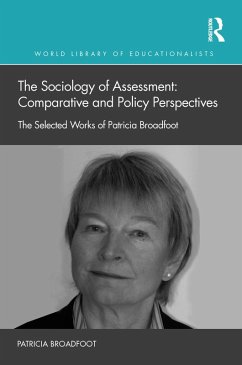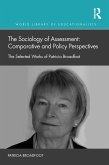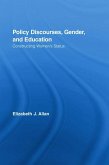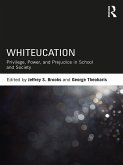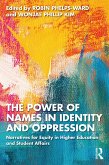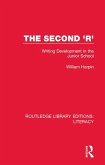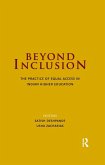Patricia Broadfoot
The Sociology of Assessment: Comparative and Policy Perspectives (eBook, ePUB)
The Selected Works of Patricia Broadfoot
38,95 €
38,95 €
inkl. MwSt.
Sofort per Download lieferbar

19 °P sammeln
38,95 €
Als Download kaufen

38,95 €
inkl. MwSt.
Sofort per Download lieferbar

19 °P sammeln
Jetzt verschenken
Alle Infos zum eBook verschenken
38,95 €
inkl. MwSt.
Sofort per Download lieferbar
Alle Infos zum eBook verschenken

19 °P sammeln
Patricia Broadfoot
The Sociology of Assessment: Comparative and Policy Perspectives (eBook, ePUB)
The Selected Works of Patricia Broadfoot
- Format: ePub
- Merkliste
- Auf die Merkliste
- Bewerten Bewerten
- Teilen
- Produkt teilen
- Produkterinnerung
- Produkterinnerung

Bitte loggen Sie sich zunächst in Ihr Kundenkonto ein oder registrieren Sie sich bei
bücher.de, um das eBook-Abo tolino select nutzen zu können.
Hier können Sie sich einloggen
Hier können Sie sich einloggen
Sie sind bereits eingeloggt. Klicken Sie auf 2. tolino select Abo, um fortzufahren.

Bitte loggen Sie sich zunächst in Ihr Kundenkonto ein oder registrieren Sie sich bei bücher.de, um das eBook-Abo tolino select nutzen zu können.
In a collection of her most influential work spanning nearly four decades, Patricia Broadfoot applies her trademark sociological and comparative perspective to empirical studies at every level of the educational system.
- Geräte: eReader
- ohne Kopierschutz
- eBook Hilfe
- Größe: 2.17MB
Andere Kunden interessierten sich auch für
![The Sociology of Assessment: Comparative and Policy Perspectives (eBook, PDF) The Sociology of Assessment: Comparative and Policy Perspectives (eBook, PDF)]() Patricia BroadfootThe Sociology of Assessment: Comparative and Policy Perspectives (eBook, PDF)38,95 €
Patricia BroadfootThe Sociology of Assessment: Comparative and Policy Perspectives (eBook, PDF)38,95 €![Twin Pandemics (eBook, ePUB) Twin Pandemics (eBook, ePUB)]() Twin Pandemics (eBook, ePUB)40,95 €
Twin Pandemics (eBook, ePUB)40,95 €![Policy Discourses, Gender, and Education (eBook, ePUB) Policy Discourses, Gender, and Education (eBook, ePUB)]() Elizabeth J. AllanPolicy Discourses, Gender, and Education (eBook, ePUB)56,95 €
Elizabeth J. AllanPolicy Discourses, Gender, and Education (eBook, ePUB)56,95 €![Whiteucation (eBook, ePUB) Whiteucation (eBook, ePUB)]() Whiteucation (eBook, ePUB)45,95 €
Whiteucation (eBook, ePUB)45,95 €![The Power of Names in Identity and Oppression (eBook, ePUB) The Power of Names in Identity and Oppression (eBook, ePUB)]() The Power of Names in Identity and Oppression (eBook, ePUB)38,95 €
The Power of Names in Identity and Oppression (eBook, ePUB)38,95 €![The Second 'R' (eBook, ePUB) The Second 'R' (eBook, ePUB)]() William Sydney HarpinThe Second 'R' (eBook, ePUB)33,95 €
William Sydney HarpinThe Second 'R' (eBook, ePUB)33,95 €![Beyond Inclusion (eBook, ePUB) Beyond Inclusion (eBook, ePUB)]() Beyond Inclusion (eBook, ePUB)51,95 €
Beyond Inclusion (eBook, ePUB)51,95 €-
-
-
In a collection of her most influential work spanning nearly four decades, Patricia Broadfoot applies her trademark sociological and comparative perspective to empirical studies at every level of the educational system.
Dieser Download kann aus rechtlichen Gründen nur mit Rechnungsadresse in A, B, BG, CY, CZ, D, DK, EW, E, FIN, F, GR, HR, H, IRL, I, LT, L, LR, M, NL, PL, P, R, S, SLO, SK ausgeliefert werden.
Produktdetails
- Produktdetails
- Verlag: Taylor & Francis eBooks
- Seitenzahl: 370
- Erscheinungstermin: 26. Januar 2021
- Englisch
- ISBN-13: 9780429557675
- Artikelnr.: 60773632
- Verlag: Taylor & Francis eBooks
- Seitenzahl: 370
- Erscheinungstermin: 26. Januar 2021
- Englisch
- ISBN-13: 9780429557675
- Artikelnr.: 60773632
- Herstellerkennzeichnung Die Herstellerinformationen sind derzeit nicht verfügbar.
Dr Patricia Broadfoot is Professor Emeritus of Sociology of Education at the University of Bristol, UK. She is a former Head of the School of Education, Dean of the Faculty of Social Sciences and Pro Vice Chancellor at the University of Bristol and was Vice Chancellor of the University of Gloucestershire, UK. She is a Fellow of the Academy of Social Sciences and was awarded the CBE for services to Social Science.
Preface Introduction Part 1 The rationality of judgement: understanding
educational assessment sociologically. 1. Competence, competition, content
and control: how assessment mediates the relationship between education and
society. 2. Selection, certification and control: meritocracy or social
reproduction? Part 2 Insights from comparing national education systems:
empirical studies of differences in the impact of assessment for system
control on teachers and pupils 3. Towards a focus on learning and culture:
time for a new approach to comparative education? 4. New forms of system
control: the power of assessment as a tool for accountability and
legitimation. 5.Using the comparative approach to understand teachers'
priorities: the 'Bristaix study of English and French education. 6. Values,
understanding and power: mapping the impact of assessment policy changes on
teachers' practice through the PACE project. 7. Comparing influences on
pupil achievement? Insights from the QUEST project. 8. Culture, context and
policy: new perspectives on learning from the ENCOMPASS study of pupils in
England, France and Denmark. Part 3 Assessment as a policy tool 9.
Performativity versus empowerment: how the 'assessment society' is
inhibiting the advent of a 'learning society'. 10. Assessment as a social
technology: the socio-cultural origins and implications of the 'standards'
agenda. Part 4 Anticipating the future: assessment for learning and the
digital revolution. 11. Enter the 'assessment society': international
trends and future challenges. 12. Challenging the status quo: the potential
of assessment for learning. 13. Towards an Assessment Revolution? The
potentially transforming potential of computer-based assessment. Epilogue
Postscript
educational assessment sociologically. 1. Competence, competition, content
and control: how assessment mediates the relationship between education and
society. 2. Selection, certification and control: meritocracy or social
reproduction? Part 2 Insights from comparing national education systems:
empirical studies of differences in the impact of assessment for system
control on teachers and pupils 3. Towards a focus on learning and culture:
time for a new approach to comparative education? 4. New forms of system
control: the power of assessment as a tool for accountability and
legitimation. 5.Using the comparative approach to understand teachers'
priorities: the 'Bristaix study of English and French education. 6. Values,
understanding and power: mapping the impact of assessment policy changes on
teachers' practice through the PACE project. 7. Comparing influences on
pupil achievement? Insights from the QUEST project. 8. Culture, context and
policy: new perspectives on learning from the ENCOMPASS study of pupils in
England, France and Denmark. Part 3 Assessment as a policy tool 9.
Performativity versus empowerment: how the 'assessment society' is
inhibiting the advent of a 'learning society'. 10. Assessment as a social
technology: the socio-cultural origins and implications of the 'standards'
agenda. Part 4 Anticipating the future: assessment for learning and the
digital revolution. 11. Enter the 'assessment society': international
trends and future challenges. 12. Challenging the status quo: the potential
of assessment for learning. 13. Towards an Assessment Revolution? The
potentially transforming potential of computer-based assessment. Epilogue
Postscript
Preface Introduction Part 1 The rationality of judgement: understanding
educational assessment sociologically. 1. Competence, competition, content
and control: how assessment mediates the relationship between education and
society. 2. Selection, certification and control: meritocracy or social
reproduction? Part 2 Insights from comparing national education systems:
empirical studies of differences in the impact of assessment for system
control on teachers and pupils 3. Towards a focus on learning and culture:
time for a new approach to comparative education? 4. New forms of system
control: the power of assessment as a tool for accountability and
legitimation. 5.Using the comparative approach to understand teachers'
priorities: the 'Bristaix study of English and French education. 6. Values,
understanding and power: mapping the impact of assessment policy changes on
teachers' practice through the PACE project. 7. Comparing influences on
pupil achievement? Insights from the QUEST project. 8. Culture, context and
policy: new perspectives on learning from the ENCOMPASS study of pupils in
England, France and Denmark. Part 3 Assessment as a policy tool 9.
Performativity versus empowerment: how the 'assessment society' is
inhibiting the advent of a 'learning society'. 10. Assessment as a social
technology: the socio-cultural origins and implications of the 'standards'
agenda. Part 4 Anticipating the future: assessment for learning and the
digital revolution. 11. Enter the 'assessment society': international
trends and future challenges. 12. Challenging the status quo: the potential
of assessment for learning. 13. Towards an Assessment Revolution? The
potentially transforming potential of computer-based assessment. Epilogue
Postscript
educational assessment sociologically. 1. Competence, competition, content
and control: how assessment mediates the relationship between education and
society. 2. Selection, certification and control: meritocracy or social
reproduction? Part 2 Insights from comparing national education systems:
empirical studies of differences in the impact of assessment for system
control on teachers and pupils 3. Towards a focus on learning and culture:
time for a new approach to comparative education? 4. New forms of system
control: the power of assessment as a tool for accountability and
legitimation. 5.Using the comparative approach to understand teachers'
priorities: the 'Bristaix study of English and French education. 6. Values,
understanding and power: mapping the impact of assessment policy changes on
teachers' practice through the PACE project. 7. Comparing influences on
pupil achievement? Insights from the QUEST project. 8. Culture, context and
policy: new perspectives on learning from the ENCOMPASS study of pupils in
England, France and Denmark. Part 3 Assessment as a policy tool 9.
Performativity versus empowerment: how the 'assessment society' is
inhibiting the advent of a 'learning society'. 10. Assessment as a social
technology: the socio-cultural origins and implications of the 'standards'
agenda. Part 4 Anticipating the future: assessment for learning and the
digital revolution. 11. Enter the 'assessment society': international
trends and future challenges. 12. Challenging the status quo: the potential
of assessment for learning. 13. Towards an Assessment Revolution? The
potentially transforming potential of computer-based assessment. Epilogue
Postscript
